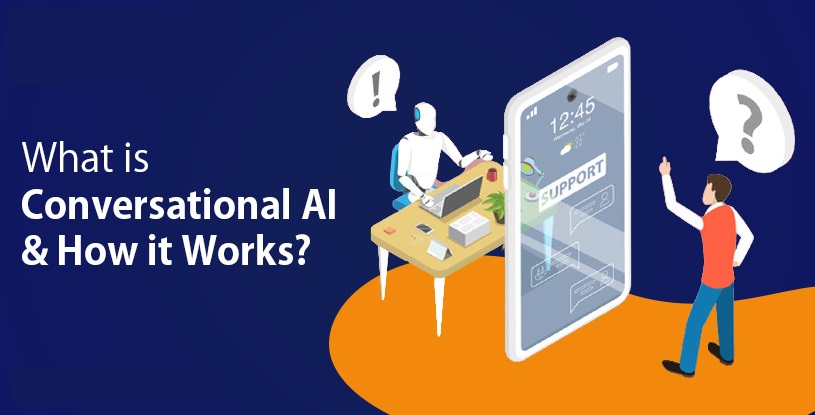AI Impact on UCaaS and CCaaS

5 min read
Table of Contents
UCaaS (Unified Communications as a Service) and CCaaS (Contact Center as a Service) are the two cloud-based communication tools, have completely changed how companies manage internal communications and customer interactions. Discover the transformative AI impact on UCaaS & CCaaS. These cloud-based solutions have improved customer service and collaboration by streamlining communication processes.
However, the recent integration of Artificial Intelligence (AI) into Unified Communications as a Service (UCaaS) and CCaaS platforms has taken these services to new heights. AI has created a world of possibilities, offering businesses efficiencies, unprecedented insights, and personalized interactions.
What are UCaaS and CCaaS?
A cloud-based platform called UC- Unified Combinations combines different communication and collaboration tools into a single, integrated solution. A cloud-based customer engagement solution called Contact Center as a Service gives businesses the tools and features to manage customer interactions effectively.
Automating Unified Communication Services with AI
Enhanced Voice Analytics and Call Routing
Machine learning algorithms are used in AI-powered call routing to examine caller data and previous interactions. It enables intelligent routing, ensuring customers are directed to the most suitable clients, improving first-call resolution rates and customer satisfaction. Additionally, voice analytics extract helpful information from conversations, assisting businesses in improving their services and effectively addressing pain points.
Chatbots and Virtual Assistants
Customer service has been transformed by AI-powered chatbots and virtual assistants. These virtual agents can respond to common questions, allowing human agents to work on more complex problems. Natural language processing (NLP) enables them to comprehend and converse with customers, creating a more exciting and individualized experience.
Real-time Translation and Collaboration
Real-time language translation is possible by AI, removing barriers to communication in multinational corporations. Teams can collaborate easily, regardless of their native languages, with the help of AI-powered translation tools built into platforms.
AI Enhancing CCaaS Customer Interactions
Improved Customer Understanding Through Sentiment Analysis
AI-driven sentiment analysis helps companies monitor customer sentiment during interactions. Organizations can better understand customer satisfaction levels and deal with problems before they arise, creating better customer experiences by analyzing tone, language, and context.
Proactive Support with Predictive Analytics
AI-enabled predictive analytics can foresee customer needs and preferences based on past data. This data can be used by CCaaS platforms to direct calls to the best agents, it reduce wait times, and boost client retention.
Omnichannel Support Powered by AI
Voice, email, chat, and social media are just a few channels that these platforms can now offer consistent and seamless customer support through. Because of the unified strategy, customers can switch between channels without losing context, leading to a more positive interaction.
What are the benefits of AI in UCaaS and CCaaS?
Enhanced Productivity and Efficiency
AI increases productivity by automating repetitive tasks so workers can concentrate on higher-value activities. In the context, Chatbots, and AI-powered routing reduce the workload for human agents, allowing them to handle more complicated problems successfully.
Improved Client Experience
Customer satisfaction is increased by AI’s capacity to deliver personalized and context-aware interactions. Providing exceptional customer experiences, which promote customer loyalty and advocacy, is made possible with the help of real-time language translation, sentiment analysis, and predictive analytics.
Making Decisions Based on Data
Organizations can take advantage of AI-driven insights and analytics to make wise decisions. Businesses can identify patterns, trends, and areas for improvement, resulting in better strategies and more effective communication practices.
Addressing Challenges and Ethical Considerations
Data Security and Privacy
Maintaining data privacy and security becomes crucial as AI systems gather and process enormous amounts of customer data. To protect confidential information, businesses must follow strict guidelines and implement reliable security measures.
Ensuring AI Fairness and Bias Mitigation
Unbiased and fair AI algorithms must be created and trained. Biased AI models can produce discriminatory results that harm a company’s reputation and the experiences of its customers.
Balancing Human Touch and Automation
Even though AI has undeniable benefits, businesses should balance human and AI-driven interactions. Certain circumstances call for human empathy and comprehension that AI cannot replicate.
Advanced AI Applications in UCaaS and CCaaS
Sentiment Analysis with AI
Sentiment analysis goes beyond analyzing customer emotions during interactions. AI-driven sentiment analysis can use to analysis employee sentiment, giving valuable information about the effectiveness and well-being of the agents. Organizations can use this data to spot potential problems, raise agent satisfaction, and implement focused training initiatives.
AI-driven Speech Analytics
Speech analytics powered by AI is a helpful tool for UCaaS and CCaaS. Organizations receive valuable information on customer interactions from the transcription and analysis of recorded calls. Businesses can effectively identify customer pain points and agent training requirements by using speech analytics to detect keywords, sentiment, and trends.
Personalization at Scale
AI makes it possible for staff and customers to interact in highly personalized ways. AI can modify communication strategies to meet the needs of each individual by analyzing data from various sources, including previous interactions, purchase history, and preferences. Personalized messages, product suggestions, and service offerings can significantly increase customers’ engagement and loyalty.
Enhancing Collaboration
This platforms’ AI-driven collaboration tools can boost team productivity. AI can analyze team dynamics, identify bottlenecks, and offer suggestions for improvement. Virtual meeting assistants can also help schedule meetings, record minutes, and provide real-time language translation during video conferences.
AI’s Role in Contact Center Workforce Management
Workforce Forecasting Powered by AI
AI can analyze historical data, call volume patterns, and other relevant metrics to predict future call loads. With the help of this forecasting capability, contact centers can optimize staffing levels and ensure enough agents are on hand to handle incoming interactions effectively.
Agent Performance Analysis Powered by AI
Agent performance can evaluate by using AI-driven analytics based on various criteria, including call handling time, resolution rates, and client feedback. This information aids managers in identifying high-performing agents and areas that might benefit from additional training or support.
AI and Gamification
AI can be used to gamify the working environment in contact centers, encouraging healthy competition and boosting agent motivation. Contact centers can improve customer interactions by increasing agent engagement by implementing performance-based challenges and leaderboards.
Overcoming Implementation Challenges
Data Integration
It takes seamless data integration from various sources to incorporate AI capabilities into current platforms. Businesses must ensure that AI models can access accurate and comprehensive data to deliver reliable insights and personalized experiences.
AI Expertise and Training
AI development and deployment expertise is necessary to implement UC. To ensure successful implementation, businesses need to spend money on AI training for their staff members or work with vendors who specialize in AI.
Making transparent AI decisions
AI algorithms’ decision-making processes may become less transparent and more complex. To gain the trust of both customers and employees, businesses must place a high priority on explanation and transparency. Ensuring that AI-driven decisions are understandable and justifiable is crucial to maintaining ethical practices.
Conclusion
The world of business communications and customer service has entirely transforms by integrating AI into these solutions. AI has a significant and wide-ranging impact on various processes, including call routing, collaboration, and the provision of personalized interactions and data-driven insights.
However, it is crucial to address the issues related to the implementation of AI, such as data privacy, fairness, and ethical considerations. Businesses can maximize these offerings, foster exceptional customer experiences, and promote business growth in the digital age by ensuring responsible AI development. As AI technology develops, the future of UCaaS and CCaaS appears bright, offering even more ground-breaking and transformative solutions for companies worldwide.
Published: July 31st, 2023
Subscribe to Our Latest Updates
Get monthly product and feature updates, the latest industry news, and more!





